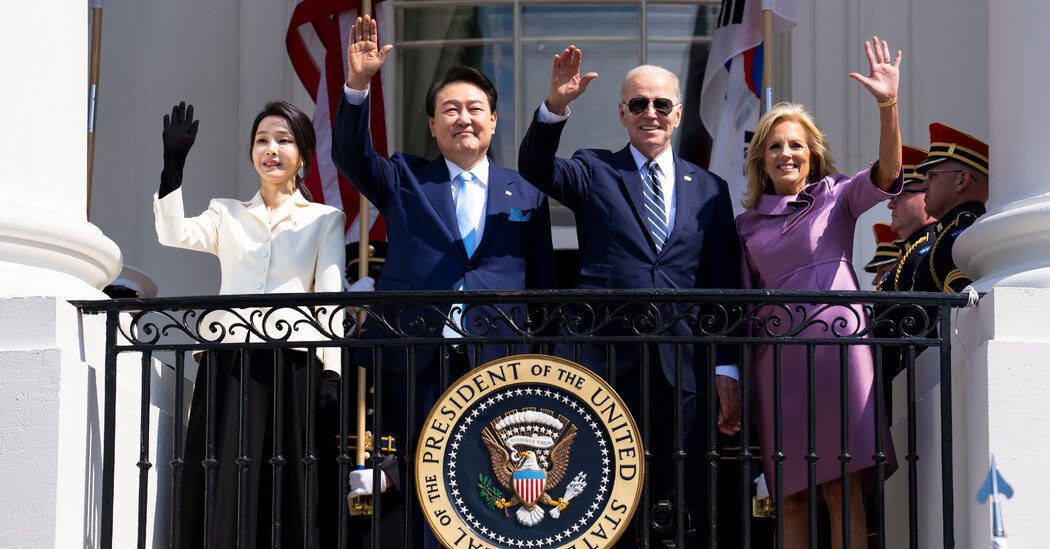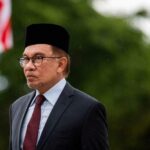Global Courant 2023-04-26 21:58:35
WASHINGTON — The United States will for the first time give South Korea a central role in strategic planning for the use of nuclear weapons in any conflict with North Korea in exchange for an agreement that Seoul will not pursue its own nuclear arsenal, US officials said .
The agreement, which the two sides are calling the Washington Declaration, is central to this week’s state visit by South Korea President Yoon Suk Yeol, who met with President Biden at the White House on Wednesday. The president plans to host Mr. Yoon later that evening for a state dinner, only the second of his administration.
The visit came at a fraught time between the two longtime allies after leaked revelations suggesting the United States had intercepted private conversations within South Korea’s National Security Council. Classified documents made public in recent weeks tell of conversations between top South Korean officials about US pressure to supply artillery munitions to Ukraine, despite Seoul’s policy of not arming combatants in active wars.
Although South Korea has provided humanitarian aid to Ukraine, it has not supplied weapons directly to Kiev. Seoul has said it was considering selling 155-millimeter artillery shells to Washington as long as the United States was the “end user”. According to the leaked documents, a top South Korean official discussed the possibility of selling grenades to Poland under the same condition, while understanding that they would still be passed on to Ukraine.
During brief opening statements to journalists in the Oval Office on Wednesday, neither Mr Biden nor Mr Yoon spoke on the matter or responded to questions ahead of a formal press conference scheduled for the afternoon. But they both praised each other’s countries and lavished praise on the 70-year alliance between the United States and South Korea.
Mr. Biden called the relationship the “hub of regional security and prosperity,” adding, “Today I am proud to say, Mr. President, that I believe our partnership is ready to meet any challenge.”
He mentioned their “shared commitment to stand with Ukraine and defend its democracy against Russia’s onslaught” without saying anything concrete about any further help he would request from Mr. Yoon.
“Our alliance is an alliance of values based on our shared universal values of freedom and democracy,” Mr. Yoon said in response. “It is not a contractual alliance”, but a “perpetual partnership”. In perhaps allusion to the surveillance controversy, he added: “Together we can solve all the problems between us.”
The two said little about North Korea in the opening statements, beyond a general commitment to resolve in light of Pyongyang’s nuclear weapons program. “We are doubling down on our cooperation as allies even as the DPRK ramps up its challenges,” Mr Biden said, using the North’s initials without adding anything specific about the nuclear commitments government officials were anticipating.
The new cooperation agreement is modeled closely on how NATO countries plan for a potential nuclear conflict, but the US president retains sole authority to decide whether to deploy a nuclear weapon. While the United States has never formally adopted a “no first use” policy, officials said such a decision would almost certainly come after the North itself used a nuclear weapon against South Korea.
John F. Kirby, a spokesman for the National Security Council, said, “I would caution anyone not to think there is a new focus on the centrality of nuclear weapons,” despite the wording of the new statement. “We have treaty obligations with the Peninsula Republic,” he said, using the abbreviation for the Republic of Korea, and “we want to make sure we have as many options as possible.”
The agreement is remarkable for several reasons. First, it is intended to provide assurance to the South Korean public, where pollsters have found consistent majorities in favor of building an independent South Korean nuclear force. Mr Yoon himself openly pondered that option early this year, although his government quickly withdrew the statement. He also raised the possibility of reintroducing US tactical nuclear weapons to South Korea, a move his administration has said in recent weeks it no longer pursues.
The United States withdrew its last nuclear weapons from Korea in 1991, under the George HW Bush administration.
But the second reason it’s important is one that the Biden administration says little about: It leans toward reversing the commitment, going back to the Obama administration, to reduce the role of nuclear weapons in US defense strategy. For years, the United States has been improving its non-nuclear strike options and improving the precision and power of conventional weapons, which can reach any target in the world in about an hour.
But the South is looking for more assurance of “prolonged deterrence,” the concept that the United States will try to deter a North Korean nuclear attack on the South with a nuclear response — even if that means a North Korean strike. on an American city.
South Korea has signed the Nuclear Non-Proliferation Treaty, which prohibits it from acquiring nuclear weapons. The commitment not to build your own weapons is therefore not new. But nations can withdraw from the treaty simply by notifying the United Nations. Only one country has done so: North Korea, in 2003. Three countries have not signed the treaty and have developed nuclear weapons: Israel, India and Pakistan.








